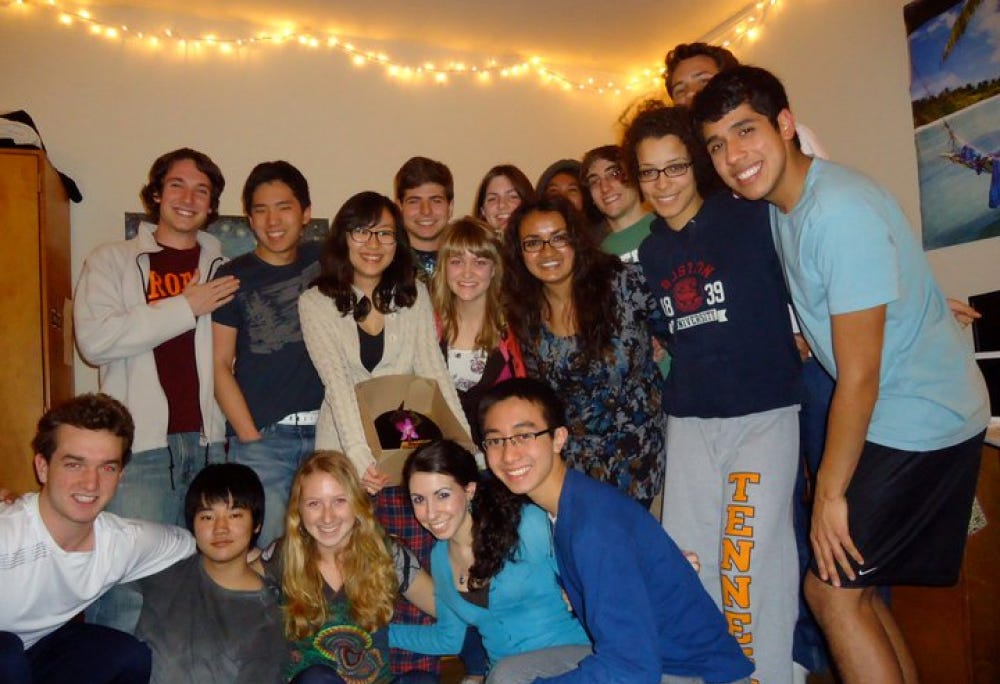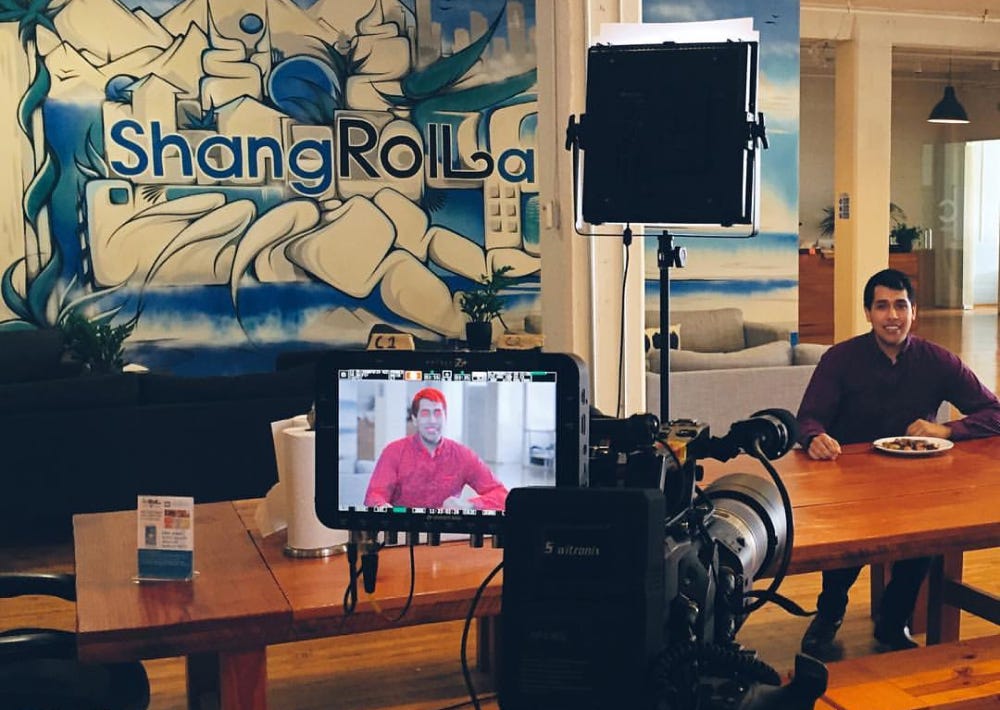How hard work, community, and a bit of luck helped Kevin Garcia become a tech marketer
Meet Kevin Garcia, a tech marketer—currently Head of Product Marketing at Retool—based in San Francisco.
Meet Kevin Garcia, a tech marketer—currently Head of Product Marketing at Retool—based in San Francisco. He shares how unexpected moments became big inflection points for his career and why hard work and community are such significant factors in finding success.
Interviewed in April 2021
This conversation has been edited for clarity and brevity.
Tell us a bit about yourself. I’m Kevin, and I’m usually based in San Francisco, but I decided to spend the last year in Los Angeles to be closer to my parents. A lot has changed for me in recent months: I started my current job without meeting anyone in person, I postponed my 2020 wedding, and I have spent more hours than I’d ever imagined on Zoom. So lots of change!
I lead product marketing at Retool, where we help developers build business apps for everything from bank loans to managing retail inventory. Before Retool, I led product marketing at Segment, a company that Twilio acquired in late 2020.
Product marketers help define what we build, how to sell it, and what stories we tell our customers. I also get to play a hand in pricing, competitive strategy, and so much more. It’s a great job for people who never want any two days to be the same.
Could you take us back to a moment or share how you got started on your journey?
Let’s jump back to junior year of high school. To set the scene, I didn’t have a lot of family or friends who had gone to college before me. I worked hard and stayed involved in school, but it was more because I liked school than any pressure to reach a specific college or career path.
So when college application season rolled around, I didn’t know where to start. And that’s when I had a life-changing conversation. My 10th-grade English teacher—who doubled as a college advisor—sat me down and demanded that I apply to top-tier schools all over the country.
Every form of imposter syndrome crept up at once: I didn’t feel smart enough, I didn’t feel financially capable, etc. But she pushed, even going as far as helping pay for applications and reviewing my essays. She strongly believed that it would happen to me.
A few months later, it did. I was accepted to Harvard with an almost full scholarship. I was floored. I accepted them back and soon started what would become one of the most amazing experiences in my life.
Harvard did not help the imposter syndrome. I was in class with 18-year-old best-selling authors, champion piano players, and students who had somehow worked in research labs for years. The ride started rocky, but I eventually found my way. And along with the degree came a lot of new skills, life-long friends, and more airline mileage than I could possibly fathom.
One thing I didn’t find in college was a clear career path. I liked doing a little of everything. I liked learning how things work. I liked building things. And, as luck would have it, an older college friend related to these traits and helped me join my first startup, Inflection. It’s where I learned that I could play a big role in building software (without coding!) and where I found my calling as a product marketer.
Fast forward a few years, and I was at AdRoll, an advertising software company that was struggling to keep momentum. After being in a rough patch long enough, the company had a few rounds of layoffs, and I ended up the last product marketer at the company.
I was still early in my career and felt hopeless. But, luck struck again, and I got the chance to help the VP of Marketing rebuild all of the marketing—and the product marketing team—from the ground up. In my time there, I helped build two new brands, spun up new products, rebuilt the team, and did some of the most challenging work I’ve ever done.

I learned new marketing skills, basic design skills, and a lot about what it takes to make a business start growing again. And it paid off. It was my career-accelerating moment. My work at AdRoll propelled me from an individual contributor to one of our top marketing leaders. And it opened a whole new level of opportunities when I decided to take the next step.
Touching back on your first inflection point, could you explain why you thought going to an Ivy League school or working in the tech community wasn’t as attainable?
I could only dream what I could imagine. I was blessed to have a loving family, a safe home, and a strong community, but I didn’t grow up surrounded by people who saw moving across the country for fancy schools or software jobs as normal. It all felt unknown and, as a result, unattainable.
I started in tech because of a connection in my network, sure, but I was mostly clueless. I didn’t know anything about venture capital, building software, or public markets. I didn’t have people in my circle who I could lean on to get the cheat codes.
Even so, imposter syndrome didn’t hit as hard the second time. I had seen what I could do when thrown into a new environment in college. So when I started in tech, my doubts were heavily outweighed by my excitement for what was possible.
You’ve also used the word “luck” a few times to describe your journey. Could you dive into why you think luck matters or if other factors contributed to your journey?
I say I’m lucky because, at first glance, my experiences feel like random luck. But I realize now that it’s silly to try and give myself or luck all the credit.
The reality is actually somewhere in between. Both are true: I think life has given me great opportunities, and I’ve worked hard to make the most of them. Case in point: I’ve had 14+ managers while working at 4 companies.
None of these transitions have been easy, and yet, many of them have been huge opportunities in disguise. When my CMO left Totango, I got much more exposure to our CEO and the product team. When my bosses left AdRoll and Segment, I took over their responsibilities and eventually their roles.
In each case, I met luck with an equal dose of hard work. I brought the best of myself even when the opportunity was scary, and I didn’t have all the answers.
For me, learning to value my role in my own success has been a process of recognizing that I am working hard, I put in the effort, and that—because of this—people are willing to extend the time and space to let me figure out bigger challenges. Whether that’s luck or not, I believe my effort is driving a large part of the equation.
“For me, learning to value my role in my own success has been a process of recognizing that I am working hard, I put in the effort, and that—because of this—people are willing to extend the time and space to let me figure out bigger challenges.”
Why does someone taking a chance on someone matter so much?
I think a lot of people, myself included, hope for a structured career path. A simple roadmap where you build experience at one step and, when the time is just right, you advance to the next.
But my career could not be further from my plan. I’ve moved laterally, I’ve moved down, and hopped around in ways that I didn’t plan or expect. Mostly because life didn’t work out neatly for me—I had inopportune windows of opportunity that I decided to take anyway.
That’s why people taking a chance on me has mattered so much. At every moment where I wished that I had been better prepared for a challenge, there was someone who believed I could pull through anyway.
It’s been a big lesson for me. People with messy careers (read: most of us) need someone rooting and advocating for them to pull through what feels impossible at the time. It’s one of the greatest things a leader can do: leave the door open enough for someone to prove themselves and cheer them on as they work through it.
People with messy careers (read: most of us) need someone rooting and advocating for them to pull through what feels impossible at the time. It’s one of the greatest things a leader can do: leave the door open enough for someone to prove themselves and cheer them on as they work through it.
How does one prepare for opportunities like this? How might we get to where you are?
In my experience, you don’t have to be an expert to be successful. But you do need to bring a few things to the table.
Be curious. Ask the questions that seem obvious. Ask people what they know about the topic and take great notes. Do additional research. You’d be amazed how often the answer is right in front of everyone’s nose, but it’s broken into pieces that no one has put together yet.
Be willing to do the hard and necessary work. You’ll build trust because you’re working on what matters. You’ll also develop intuition around how your business works. Both of these things are critical when working on whatever becomes the next big opportunity.
Be collaborative. Few success stories have one protagonist. Help the team work better together. Do what’s right for customers and the business. When people genuinely love working with you, you’ll have many more opportunities than going it all alone. It’ll also be way more fun.
Finally, be honest. Everyone is learning something. Lean into what you’re good at and say out loud the areas you hope to improve.
When I told a former manager and another teammate, “I feel strong in market research, but I’m not as confident in driving product sales,” it tripled the amount of people invested in helping me build up that skill. I got more, not less, opportunities to learn. I had people cheering me on and keeping me accountable.
Give your community the chance to be a part of your success. In my experience, they never disappoint.
Give us a list of the top 3 things you’d recommend.
Since I’m currently in Los Angeles, home to Hollywood, I’ll share some recommendations that I think might be perfect for your next movie night.
My top 3 movies you need to watch are:
Coco. It’s stunning, musical, and warm-hearted in the best way.
The Truman Show. Jim Carrey at his best with a cool reality TV concept.
A Quiet Place. Really creative scary movie with a family drama mixed in.
Fave song of the moment, or what do you have on repeat right now?
Save Your Tears – The Weeknd
Continue the conversation with Kevin.
You can find him on Twitter @garciakevin and Linkedin.
Kevin is also passionate about giving back to animals.
As part of this conversation, a donation was made to the ASPCA, an organization dedicated to helping animals find safe homes, medical care, and rehabilitation. Kevin is a proud rescue dog dad and hopes to help give more animals a second chance.
This post contains affiliate links. When you buy from a link, west & ease may earn a commission.












